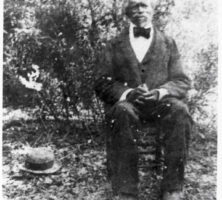Neptune Small was an enslaved man from Glynn County, in coastal Georgia, who accompanied members of the Thomas Butler King family to fight in the Civil War (1861-65).
Small was born into slave status on September 15, 1831, on Retreat Plantation, the home of the King family of St. Simons Island. He was chosen to look after the older King sons and bonded quickly with the third son, Henry Lord Page King (known as Lord), who was only five months older. Together they learned to read and write under the tutelage of Anna Matilda Page King, Thomas Butler King’s wife.

When the Civil War broke out in 1861, Henry Lord Page King and his brothers enlisted in the Confederate army, and Small accompanied King as his manservant. For almost two years Small cared for King as they marched across the country and fought the battles of the Peninsula (Virginia), Richmond (Virginia), Sharpsburg (Maryland), and Harpers Ferry (West Virginia).
On December 13, 1862, during the battle of Fredericksburg (Virginia), King volunteered to carry a dispatch from Major General Lafayette McLaws to Brigadier General Thomas R. R. Cobb. He was shot while returning to his regiment after delivering the dispatch. Small waited for King until dark, but when he did not return, Small began searching the battlefield, where he found King’s body.
The next morning Small enlisted the help of some officers to make a pine box to carry King’s body to Richmond. There, he purchased a coffin and then accompanied the body to Savannah. It is believed that King’s brothers and sisters joined Small in Savannah to bury their brother in a temporary grave—it was not safe to return the body to their home on St. Simons Island, as the Union forces were using it for their island headquarters.
Although U.S. president Abraham Lincoln’s Emancipation Proclamation of 1862 made him a free man, Small returned to the front to serve R. Cuyler “Tip” King, the youngest son, until Confederate forces surrendered in 1865.
After the war Small traveled to Savannah to accompany Lord King’s body to the family plot at Christ Church Cemetery on St. Simons. The King family gave Small a piece of property on their plantation, where he built his home and lived for many years with his wife, Ila, and their children. Later, a portion of his property was sold to the city of St. Simons and turned into a park that bears his name and overlooks the ocean pier.
As a free man, in what may have been a humorous reference to his stature, he chose the last name “Small” and returned to Retreat Plantation, where he continued working for the King family. In addition to helping them rebuild, tending to the gardens, and keeping up the graveyard at Christ Church, Small also helped to plant the rows of oak trees that still line the entranceway to Retreat.
Small lived more than forty years as a free man. He died at the age of seventy-five on August 10, 1907, and is buried in a cemetery for those enslaved on the Retreat Plantation and their descendants.





